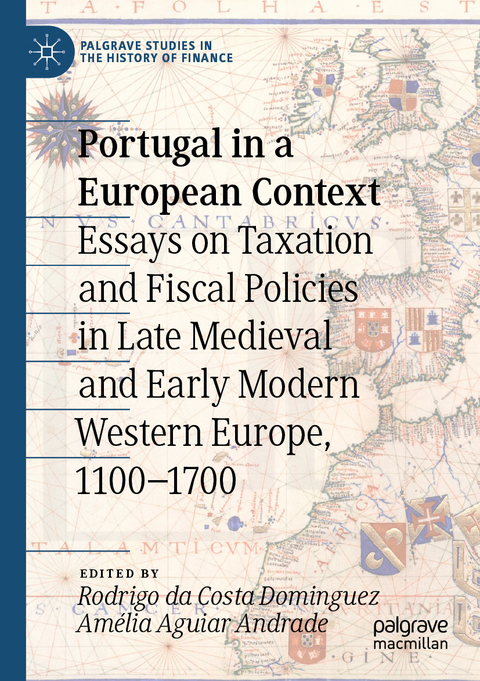
Portugal in a European Context
Springer International Publishing (Verlag)
978-3-031-06229-2 (ISBN)
As a very distinctive case, Portugal remains understudied and underrepresented in the broader literature on the development of fiscal states. There are relatively few studies on the building of a fiscal state in Portugal that are accessible to an international audience. This book will make a fundamental contribution to this field, which is still full of untapped potential. It will combine the latest theory and comparative context with a detailed reconstruction of Portuguese state finance, taking a longer chronological frame that follows its development from the medieval through to the early modern period. It will also make the latest research from Portuguese scholars available to a wider, international audience, and will be of particular interest to researchers and students of financial and economic history.
Rodrigo da Costa Dominguez is currently a Junior Research Associate and Assistant Director of the Interdisciplinary Center of Social Sciences (CICS) at the University of Minho, in Braga, Portugal. He is also a member of international economic, fiscal and social history associations in Portugal, Spain, Brazil, Latin America and United States, being also President-elect of the Economic and Business History Society (EBHS - USA) for the mandate 2020-2021.
Amélia Aguiar Andrade is a Full Professor in Medieval History at the Faculty of Social and Human Sciences, New University of Lisbon (NOVA FCSH), Portugal. She has held numerous scientific and university positions, in Portugal and abroad, being recently accepted in the College of Expert Reviewers of the European Science Foundation (ESF). Since 2011, she has been Director of the Mario Sottomayor Cardia library and the NOVA FCSH Documentation Centers and, since 2016, the National coordinator of DARIAH -Description the Digital Research Infrastructure for the Arts and Humanities and the ROSSIO's Infrastructure Representative.
Introduction.- Part I: Medieval and Early Modern Portuguese State Finances: sources and evidence.- Chapter 1:"The study of Medieval Fiscal History in Portugal: results and problems (1951-2020)".- Chapter 2: "The collection of annates in Portugal during the Papacy of Avignon, c. 1316-1378: just another case of apostolic tax-collecting in a realm at the back of beyond?".- Chapter 3: "Was the economy an Issue? Kings and economic legislation in Medieval Portugal, c. 1200-1400".- Chapter 4:"A difficult transition: Portuguese State finances between later medieval and early modern times, c. 1430-1530".- Chapter 5:"Taxes and fiscal institutions in a maritime empire: a comparative view of overseas' territories under the Portuguese Crown".- Part I afterword.- Part II: The development of state finance: Portugal in European context.- Introduction.- Chapter 1:"The "resource curse" of medieval English state finances, c. 1155-1453".- Chapter 2:"Tax histories in the Kingdom of France (12th to 15th centuries): policies, rules and practices".- Chapter 3:"Tradition and innovation in late medieval and early modern (Northern) Italy".- Chapter 4:"A Treasury in transition: changes and continuity in the management of Castilian State income and expenditure during the reign of Isabella I, c. 1474-1504.- Chapter 5:"The Public debt in the Crown of Aragon at the end of the Middle Ages: A particular case?".- Chapter 6:Low Countries) - "Why Holland had a financial revolution, but Flanders and Brabant did not".- Chapter 7:"Financial policy and fiscal control of the Papal States territory in Early Modern Age".- Part II afterword.
| Erscheinungsdatum | 04.01.2024 |
|---|---|
| Reihe/Serie | Palgrave Studies in the History of Finance |
| Zusatzinfo | XXII, 331 p. 5 illus., 3 illus. in color. |
| Verlagsort | Cham |
| Sprache | englisch |
| Maße | 148 x 210 mm |
| Gewicht | 437 g |
| Themenwelt | Geisteswissenschaften ► Geschichte ► Regional- / Ländergeschichte |
| Geschichte ► Teilgebiete der Geschichte ► Wirtschaftsgeschichte | |
| Wirtschaft ► Allgemeines / Lexika | |
| Wirtschaft ► Betriebswirtschaft / Management ► Finanzierung | |
| Schlagworte | Financial Policy • Financial Revolution • medieval fiscal history in Portugal • medieval taxation • Portuguese Fiscal History • Portuguese historiography • Public Debt |
| ISBN-10 | 3-031-06229-9 / 3031062299 |
| ISBN-13 | 978-3-031-06229-2 / 9783031062292 |
| Zustand | Neuware |
| Informationen gemäß Produktsicherheitsverordnung (GPSR) | |
| Haben Sie eine Frage zum Produkt? |
aus dem Bereich


